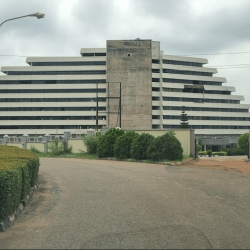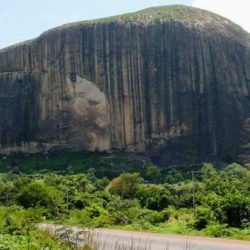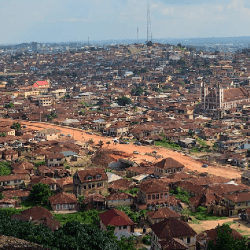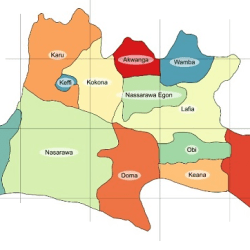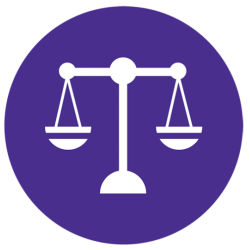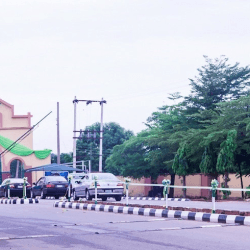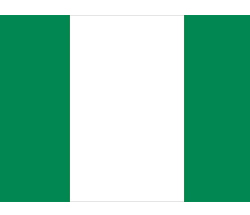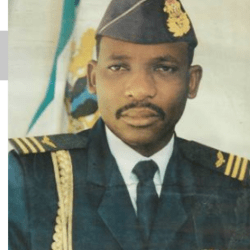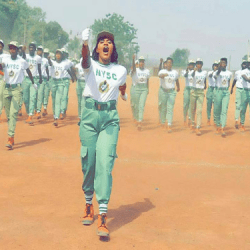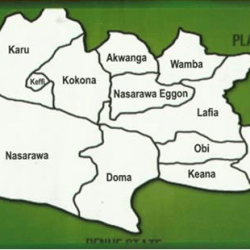The State has a climate typical of the tropical zone because of its location and is quite pleasant. It has a maximum and minimum temperature of 81.7ᵒ F and 16.7ᵒ F respectively.
Rainfall varies from 131.73cm in some places to 145cm in others. The months of December, January and February are cold due to harmattan wind blowing across the State from the North-East.
It is characterized by two distinct season: dry and rainy. The dry season spans from November to February, while the rainy season is from March to October.
Nasarawa State
Nasarawa, a state in Nigeria, was created from Plateau State of Nigeria on 1st October, 1996.
State Capital:- Lafia
Land Area:- 27,116.8 square kilometers (Approximate Landmass).
Local Governments:- (13) Akwanga, Awe, Doma, Karu, Keana, Keffi, Kokona, Lafia, Nasarawa, Nasarawa Eggon, Obi, Toto, Wamba.
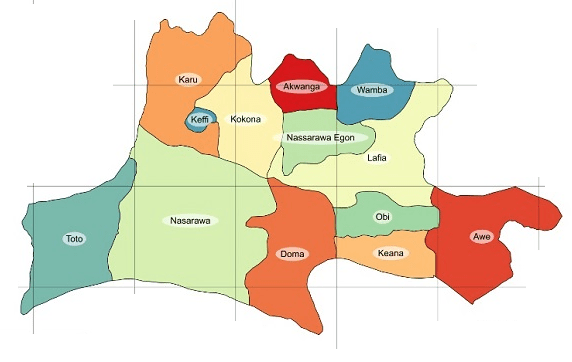
Boundaries
North- West by the Federal Capital Territory (FCT), Abuja
North- East by Plateau State
North by Kaduna State
South by Benue State
South –West by Kogi State
South East by Taraba State

Location
Located in the Middle-Belt region (Latitudes of Central position 080-35’ and Longitudes of Central position 08 – 2F.
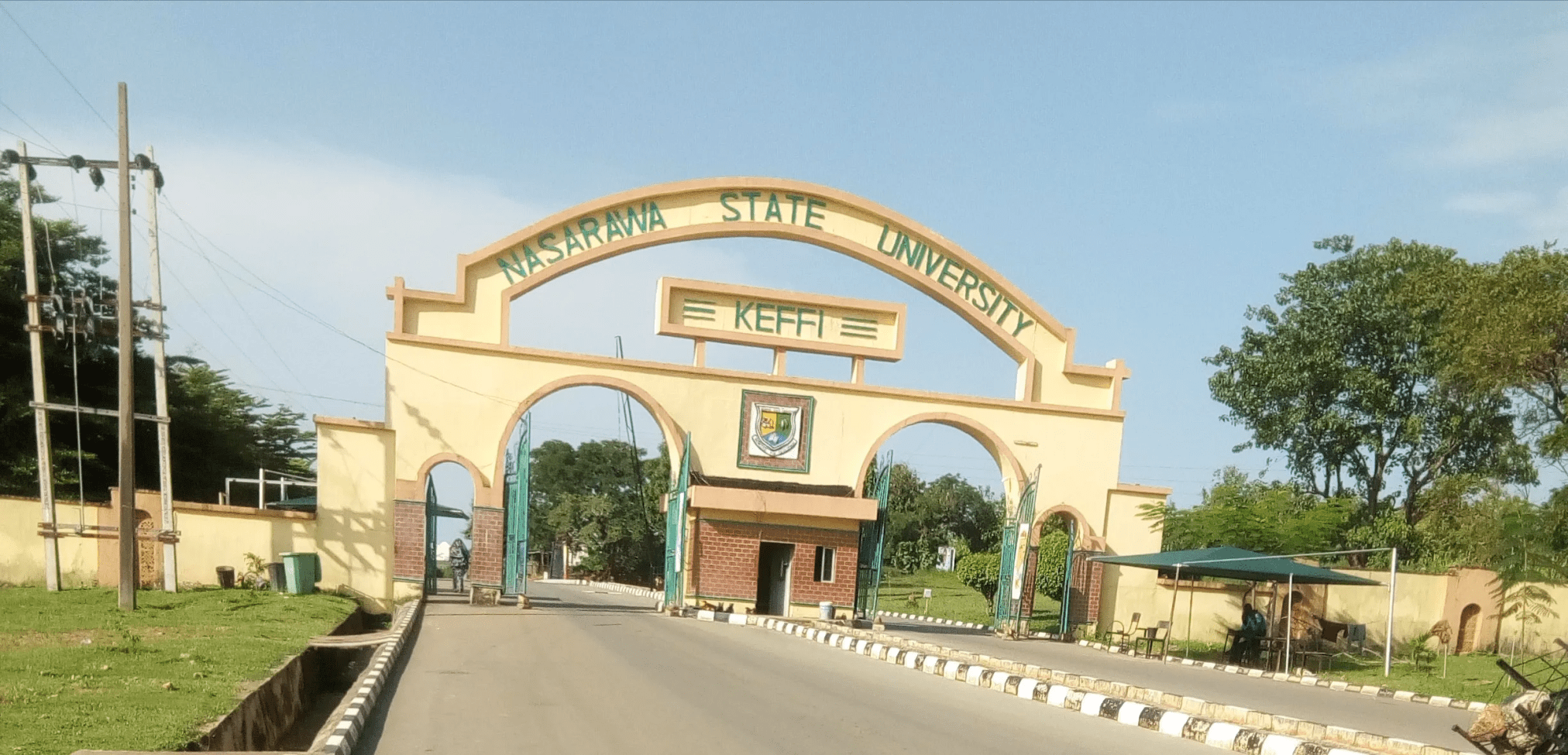
Climate
It lies within the guinea Savannah region and has tropical climate. Rainfall is moderate with a mean annual rainfall of 1311:75cm.
Features
It is made up of plain lands and hills measuring up to 300ft above the sea level at some points.
Tourist Attractions
Farin Ruwa Waterfalls Wamba; Water Falls of Eggon Hill; Giza Crocodile Pond (Giza) Akiri Warm Spring. (Azara) Hunki Ox-bow lake in (Awe) Lafia Spring Water (Assakio). Captain Moloney Tomb (Hills) Keffi, Dying pits in Keffi and Lafia. Bakono Game Reserves (Nasarawa). Ara Rock (Nasarawa) Elongated Feruwa Lake at Assakio.
Solid Minerals
Barytes (Azara) Salt mines (Keana), (Awe) and (Azara) gypsum in (Awe and Azara). Marble in Toto, galleria, tin, gemstone, mica kaolin and columbite are found in large quantities in many part of the State; also available are clays, zircon, feldspars, cassiterite, and limestone.
Economy
Because of the agrarian economy of the State and its proximity to Abuja, it guarantees a ready fast moving market for its various agricultural crops and products, which include yams, maize, rice, guinea corn, beans, tomatoes. acha, groundnuts, cotton, millet, cassava, oranges, banana, apples and wheat.
Industries
Efforts are in top gear to create a good industrial base. A package of incentives awaits potential investors. The state has now acquired its permanent Trade Fair Complex along Jos road so as to boost industrialisation and encourage the organised private sector to set up small scale industries and agro-allied ventures.
Education
Four (4) Tertiary institutions are located in the State. They are the College of Education, Akwanga; College of Agriculture, Lafia; College of Arts, Science and Technology, Keffi and the Federal Polytechnic, Nasarawa. Their aim is to invest in human resources development for the much needed state’s manpower. High premium is placed on education while much emphasis is centered on primary education, which is the bedrock upon which other academic structures can be built up. Plans are currently on top gear to establish a State University.
Water Supply
The State is well supplied with treated Pipe-borne water in all Local government areas.
Transportation
The State is well linked by rail and road networks making it accessible from all parts of Nigeria. The State’s Mass Transit Agency provides sufficient transportation in and around the State and is popularly known as ‘ON THE MOVE’. Postal and Telecommunications facilities are also readily available in the State and most of the Local Governments are linked with telephones.
Peace and Security
Peace and Security of lives and properties of the people and foreigners living in the State is not only the major pre-occupation of the authority but it is fully guaranteed and the entire inhabitants go about and freely with their normal daily business uninterrupted.
Reference: nasarawastate.org/data.htm
